The Division of Services for People with Disabilities (DSPD) is responsible for providing residential, day services, family support services, and attendant care for people with severe intellectual disabilities and other related conditions, including brain injury and physical disabilities. To receive services, people must have substantial functional limitations in three or more of the following life activities: self care, receptive and expressive language, learning, mobility, self direction, capacity for independent living, or economic self-sufficiency. The services provided range from limited family support to a full array of 24-hour services both in the community and at the Utah State Developmental Center. Services are also available in private Intermediate Care Facilities for people with an Intellectual Disability (ICFs/ID) with funding through the Department of Health.
Additional information regarding the Division of Services for People with Disabilities can be found on its official website found at: Utah Division of Services for People with Disabilities
The Division of Services for People with Disabilities' most recent annual report can be found at: DSPD Annual Report - FY2014
During the 2015 General Session, the Legislature appropriated for Fiscal Year 2016, $277,937,500 from all sources for Services for People w/ Disabilities. This is a 9.4 percent increase from Fiscal Year 2015 revised estimated amounts from all sources. The total includes $81,861,000 from the General/Education Funds, an increase of 20.7 percent from revised Fiscal Year 2015 estimates.
In addition to statewide compensation and internal service fund cost increases, the following appropriation adjustments were made during the 2015 General Session:
Separate tables are shown under the tab labeled "Financials" in each COBI section. These tables provide information regarding: 1) funding sources (where the money comes from), 2) standardized state expenditure categories (where the money goes), and 3) agency sub-programs (when viewed at the line item level). For the most recent completed fiscal year, the following information represents the purposes for which the money was used:
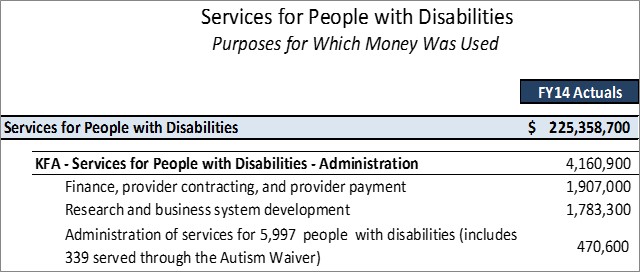
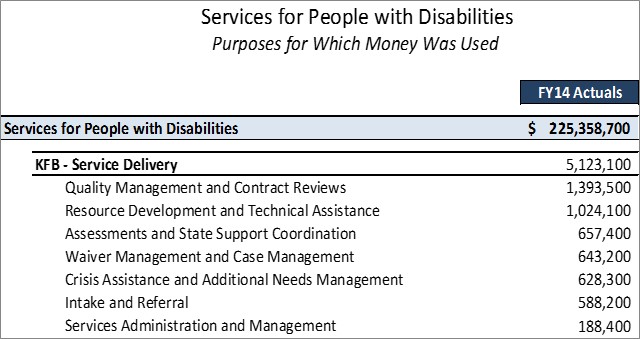
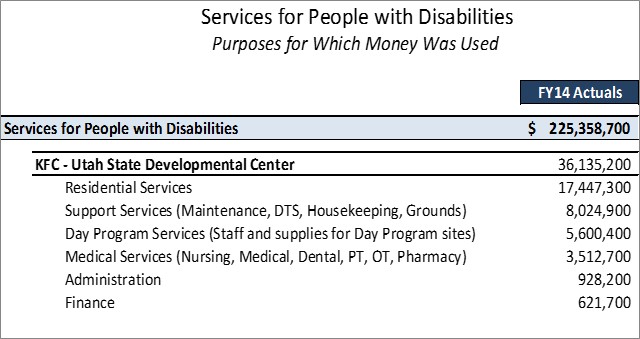
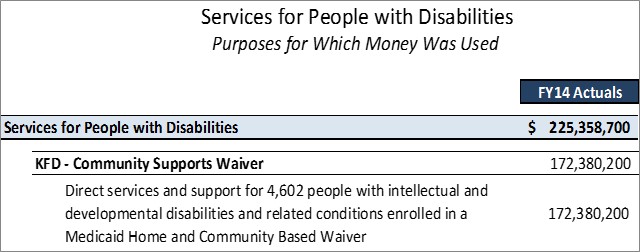
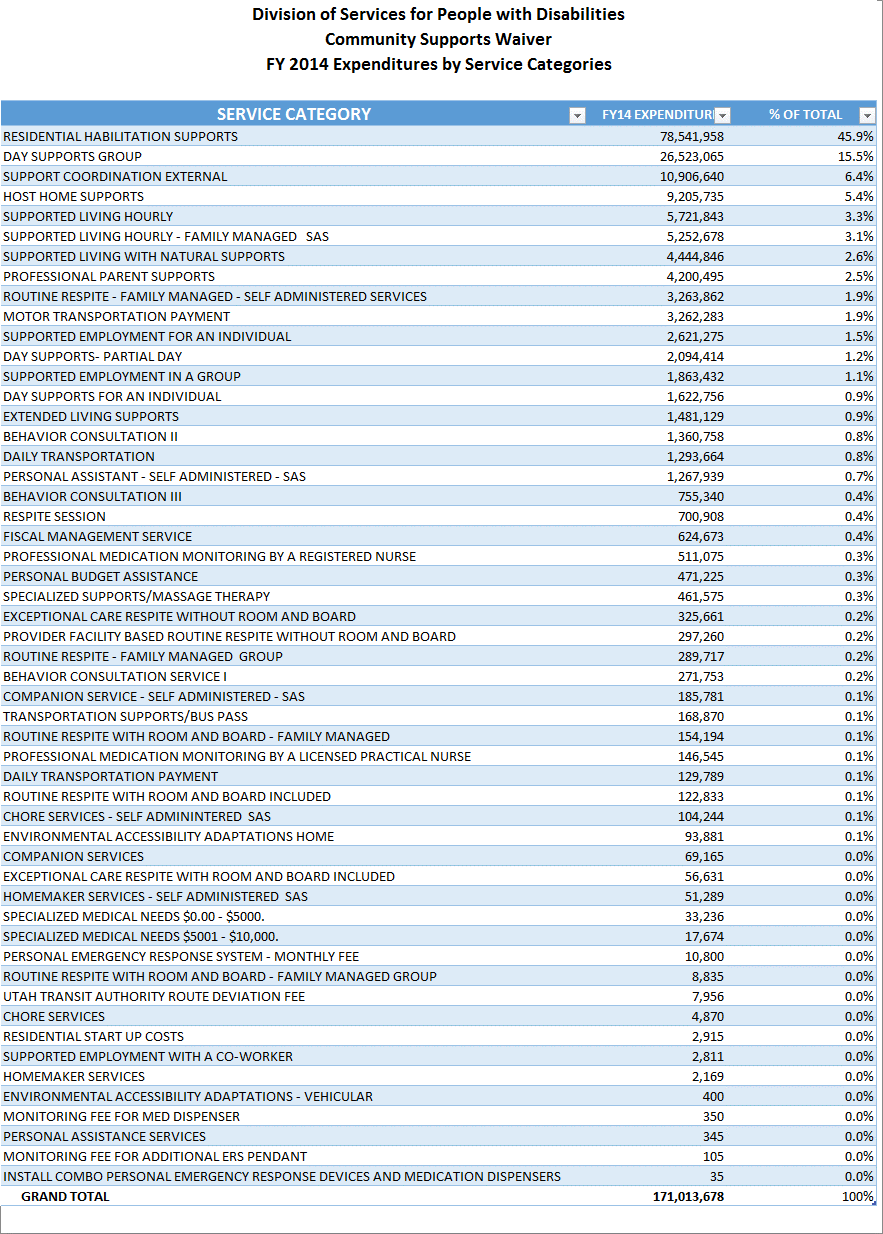
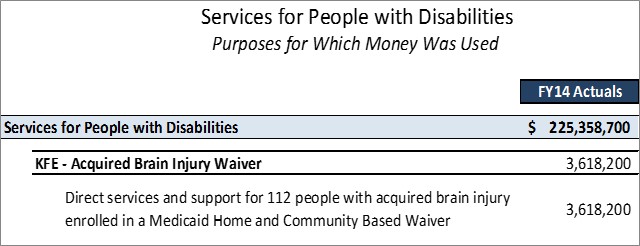
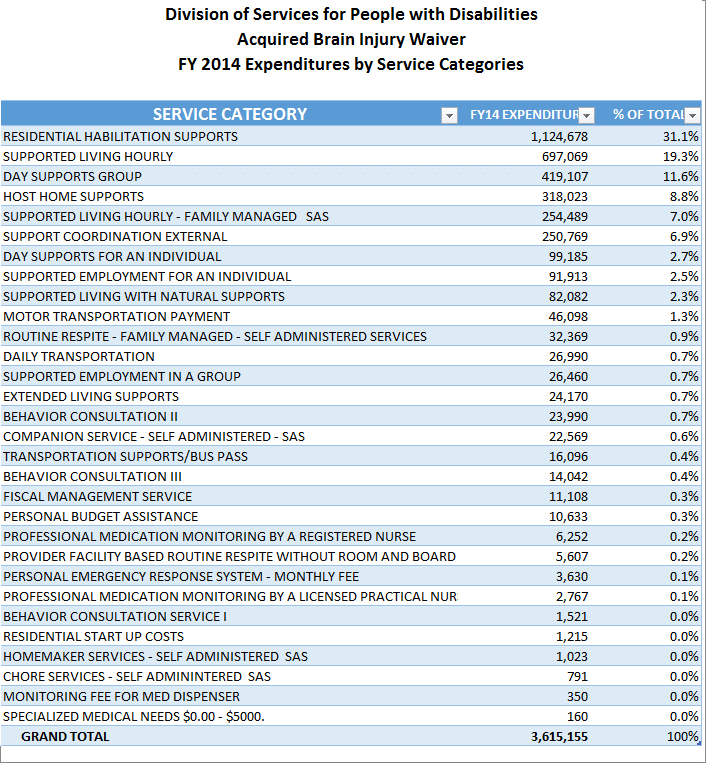
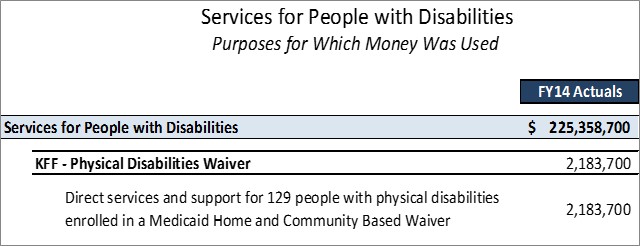

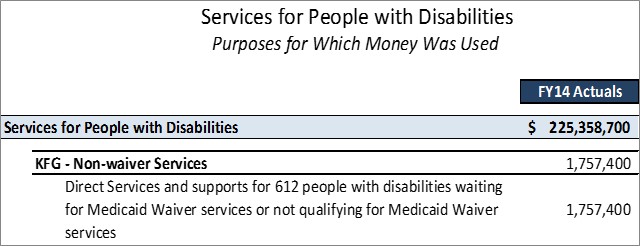
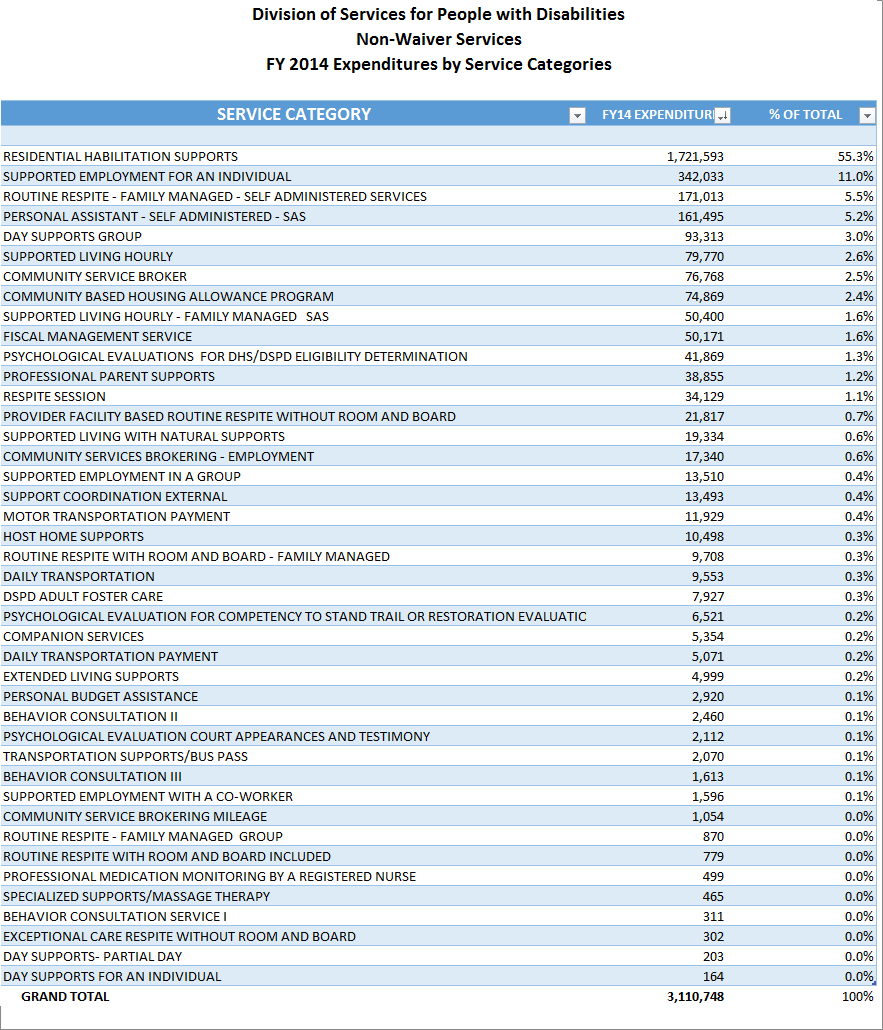
In FY 2014 there were 176 community providers delivering services on behalf of the Division of Services for People with Disabilities. Of the 176, 40 providers delivered 89 percent of the total amount expended on these services as the following table shows.
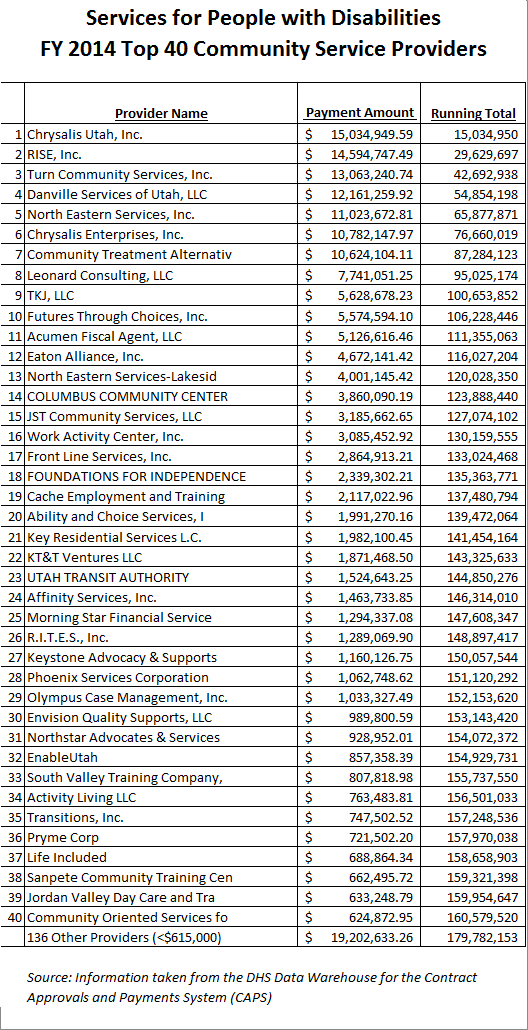
Issue Brief - 2014 Interim - Disabilities Waiting List and Needs Assessment Study
Issue Brief - 2014 Interim - Disabilities Transporation Service Study
OLAG - A Performance Audit of the Division of Services for People with Disabilities
Intermediate Care Facilities for People with an Intellectual Disability (ICFs/ID)
The other system of providing Medicaid-supported services for individuals with disabilities is the mix of privately and publicly owned and operated ICFs/ID. Private institutions range in size from 12 beds to more than 80 beds. The ICF/ID system is funded through the Division of Medical and Healthcare Financing in the state Department of Health (Medicaid). The Utah State Developmental Center in American Fork, with a current population of 203 residents, is a state operated ICF/ID and is funded through DSPD. The ICF/ID system is approximately 70 percent financed with federal Medicaid funds. If qualified, patients have a right to be admitted to an ICF/ID. There cannot be a waiting list for ICF/ID services.
Home and Community-based Services (HCBS)
The state has also chosen to provide an alternative to the ICF/ID system, which is the Home and Community-based Services (HCBS) system. The HCBS system includes a range of services and supports for individuals in homes and apartments, including full residential placement arrangements located in community settings throughout the state. This system is also 70 percent funded by Medicaid as a result of being a Medicaid waiver program. Unlike ICFs/ID, this service is not an entitlement to eligible individuals, but can only be used to the extent that resources permit. Therefore, most states have waiting lists for services in their HCBS programs. The HCBS system is funded through the Division of Medical and Healthcare Financing of the state Department of Health which contracts with DSPD to operate certain of its HCBS waiver programs. This includes determining eligibility for services and serves as the gatekeeper for the HCBS systems. It is a Medicaid requirement that the health and safety service needs of individuals receiving services under the HCBS waiver be met. The Medicaid waiver requires a review of an individual's needs take place at least annually. Approximately 10 percent of individuals on the waiver are identified each year as having increased health and safety needs due to worsened conditions.
Waiting List for Home and Community Based Services
There are more eligible people desiring home and community-based services under the Medicaid waiver than there are resources available. This has caused a waiting list. This list has grown from 498 in 1990 to 1,930 in 2014. The number of people served since 1990 has grown from 1,989 to 4,964, which is a 149 percent increase.
Emergency Services
Each year, there are emergencies requiring immediate assistance from the division. A crisis may arise when persons with disabilities grow older and develop behavior problems or when natural caretakers become ill or die. A crisis may also arise in cases where individuals are committed to division services by the courts. Children aging out of state custody in the divisions of Child and Family Services (DCFS) and Juvenile Justice Services are also required to be served by DSPD. In FY 2014 the total number was 29. When these youth become adults they age out of DCFS custody and lose the funding previously provided for them as the funding stays with DCFS to pay for new children and youth with intellectual disabilities placed in state custody. As a condition of the federal waiver approval, Utah agrees not to drop current waiver recipients from service (State Medicaid Directors Letter -- Olmstead Update No. 4).
Portability between ICFs/ID and Home and Community-based Services
In 1998, legislation set in motion a process where individuals with developmental disabilities and/or intellectual disabilities who are receiving state services could move from institutional care (ICFs/ID) to Home and Community-based Services (HCBS), or the reverse. Since FY 2005, approximately 72 people have moved from the ICFs/ID system to services in the community. It was originally agreed that to facilitate these moves, state funds would also be transferred from the Department of Health, which funds ICFs/ID clients, to DSPD, which funds the community services program.
After several years of experience, it was observed that as individuals transferred out of ICFs/ID, new clients soon entered the system and filled the vacated beds. This added cost prevented the Department of Health from shifting any additional funds to DSPD for clients transferred to the community waiver services. Therefore, a moratorium was placed on further portability transfers in FY 2003. In FY 2005, the Legislature appropriated new funding for portability to the Department of Health which allowed for some individuals to transfer to community service. Since that time, additional appropriations to allow portability have been inconsistent.
The ICF/ID industry occupancy is consistently at 99 percent. UCA 26-18-503, Authorization to Renew, Transfer or increase Medicaid Certified Programs, authorizes the Medicaid director to consider how to add additional capacity to the long-term care delivery system to best meet the needs of Medicaid recipients. Over the years, Medicaid has managed service capacity for this population through a balanced approach of adding capacity to both facility based and community based services. For facility based services, a limited number of additional ICF/ID beds has been authorized. For community based services, a factor has been added to Medicaid's Case Load and Utilization line item to allow a limited number of individuals to transfer from ICFs/ID into the Community Supports Waiver.
Medical and Health Care Financing - Medicaid
Utah's Medicaid agency is the Division of Medical and Healthcare Financing (DMHF) in the Department of Health. This agency coordinates with DSPD to establish rates and eligibility, prepare revisions and renewals of Utah's Home and Community-based Services (HCBS) waivers, process reimbursements for Medicaid funds, and train and monitor for compliance. DSPD administers three HCBS waivers: 1) Community Supports, 2) Acquired Brain Injury, and 3) Physical Disabilities. DMHF also contracts with and provides administrative oversight for private Intermediate Care Facilities for people with an Intellectual Disability (ICFs/ID).
Non-Lapsing Authority and Attrition
DSPD has nonlapsing authority to carry any unused funds from one fiscal year into the subsequent fiscal year. These funds can only be used for one-time expenditures unless otherwise authorized by the Legislature (UCA 62A-5-102(7)). Nonlapsing balances are often created because DSPD generates savings through attrition when individuals receiving services exit the program. Attrition can occur when an individual moves out of state or relocates into institutional care, the individual dies, or the individual no longer meets the eligibility requirements. The 2004 Legislature approved a plan to allow the use of nonlapsing funds to cover ongoing costs associated with emergency services and individuals who age out of foster care with the understanding that internal savings will generate the ongoing base funds needed to continue their services in future years. This authority has been annually reviewed and then renewed through adoption of intent language.
Utah State Developmental Center Land Fund -- Restricted Special Revenue Fund
In 1995, the Legislature created the Account for People with Disabilities (UCA 63A-5-220) and renamed the account the Utah State Developmental Center Land Fund in 2013. The fund consists of proceeds from the sale or lease of lands and facilities at the Utah State Developmental Center (USDC) located in American Fork. By statute, the department may only use interest earned on the fund itself. After approval by the division director in consultation with the department executive director, these funds may be used for the benefit of the Utah State Developmental Center and programs described in Title 62A, Chapter 5, which is the DSPD section of the code.
For analysis of current budget requests and discussion of issues related to this budget click here.
COBI contains unaudited data as presented to the Legislature by state agencies at the time of publication. For audited financial data see the State of Utah's Comprehensive Annual Financial Reports.